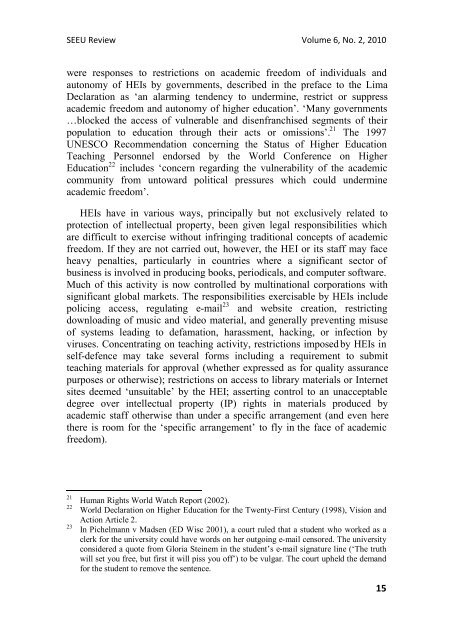SEEU Review vol. 6 Nr. 2 (pdf) - South East European University
SEEU Review vol. 6 Nr. 2 (pdf) - South East European University
SEEU Review vol. 6 Nr. 2 (pdf) - South East European University
Create successful ePaper yourself
Turn your PDF publications into a flip-book with our unique Google optimized e-Paper software.
<strong>SEEU</strong> <strong>Review</strong> Volume 6, No. 2, 2010were responses to restrictions on academic freedom of individuals andautonomy of HEIs by governments, described in the preface to the LimaDeclaration as ‘an alarming tendency to undermine, restrict or suppressacademic freedom and autonomy of higher education’. ‘Many governments…blocked the access of vulnerable and disenfranchised segments of theirpopulation to education through their acts or omissions’. 21 The 1997UNESCO Recommendation concerning the Status of Higher EducationTeaching Personnel endorsed by the World Conference on HigherEducation 22 includes ‘concern regarding the vulnerability of the academiccommunity from untoward political pressures which could undermineacademic freedom’.HEIs have in various ways, principally but not exclusively related toprotection of intellectual property, been given legal responsibilities whichare difficult to exercise without infringing traditional concepts of academicfreedom. If they are not carried out, however, the HEI or its staff may faceheavy penalties, particularly in countries where a significant sector ofbusiness is in<strong>vol</strong>ved in producing books, periodicals, and computer software.Much of this activity is now controlled by multinational corporations withsignificant global markets. The responsibilities exercisable by HEIs includepolicing access, regulating e-mail 23 and website creation, restrictingdownloading of music and video material, and generally preventing misuseof systems leading to defamation, harassment, hacking, or infection byviruses. Concentrating on teaching activity, restrictions imposed by HEIs inself-defence may take several forms including a requirement to submitteaching materials for approval (whether expressed as for quality assurancepurposes or otherwise); restrictions on access to library materials or Internetsites deemed ‘unsuitable’ by the HEI; asserting control to an unacceptabledegree over intellectual property (IP) rights in materials produced byacademic staff otherwise than under a specific arrangement (and even herethere is room for the ‘specific arrangement’ to fly in the face of academicfreedom).212223Human Rights World Watch Report (2002).World Declaration on Higher Education for the Twenty-First Century (1998), Vision andAction Article 2.In Pichelmann v Madsen (ED Wisc 2001), a court ruled that a student who worked as aclerk for the university could have words on her outgoing e-mail censored. The universityconsidered a quote from Gloria Steinem in the student’s e-mail signature line (‘The truthwill set you free, but first it will piss you off’) to be vulgar. The court upheld the demandfor the student to remove the sentence.15
















